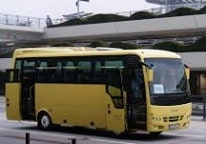The Latin word omnibus , which translates as "for all" , came into French as omnibus . That is the immediate etymological antecedent of omnibus , a term that refers to a means of transportation .
A Latin word that was formed from the sum of two lexical components of that language: the word "omnis", which can be translated as "everything", and the suffix "-bus", which indicates the dative plural.
 A bus is a vehicle with the capacity to transport many people . It is generally part of public transportation and provides services within a city .
A bus is a vehicle with the capacity to transport many people . It is generally part of public transportation and provides services within a city .
Many times the concept is used as a synonym for bus or bus , depending on the country. Its specific meaning depends on the context, although the idea always refers to a vehicle whose design and size allow it to transport numerous individuals simultaneously.
The bus usually travels a fixed urban or interurban route . Passengers must pay a certain amount to use the service and can get on or off the transport at various stops.
A bus can have a capacity of between eight and one hundred and twenty passengers. The smallest model is known as a microbus , while the articulated bus and double-decker bus are the largest. In some cases, buses continue loading passengers when there are no more seats available: people, in this framework, must travel standing.
It is important to keep in mind that the various regionalisms mean that there are several words to refer to different types of buses. In Argentina , for example, the intercity bus is called a collective , while the bus that makes long-distance routes is known as a micro .
If we think about the Canary Islands, for example, the bus, in any of its variants, is known by the name "guagua."
In the field of television , on the other hand, an omnibus program or container program is called one that has several blocks or units of independent entity. These programs can include talent contests, interviews with personalities, comedy sketches and live music, to name a few possibilities.
In the same way, we cannot ignore that there is a literary saga that is called "Omnibus: Trilogy of The Great Families." It is written by Maurice Druon and is made up of these three novels: "The Great Families", "The Fall of Bodies" and "Appointment in Hell".
As its title already indicates, it revolves around two family clans: the Schoudler and the La Monnerie. Starting in 1915, the reader meets those who will see their destinies intertwined when two people, one member of each of them, get married. We are referring to François and Jacqueline.
From that moment, a journey will be made through the passing of the years and the lives of those families who will be involved in plots of power, revenge, ambition and all against the backdrop of a turbulent political situation worldwide.
Another work that has the term in question in its title is "The Lost Omnibus", which was published in 1947 and was written by John Steinbeck.
